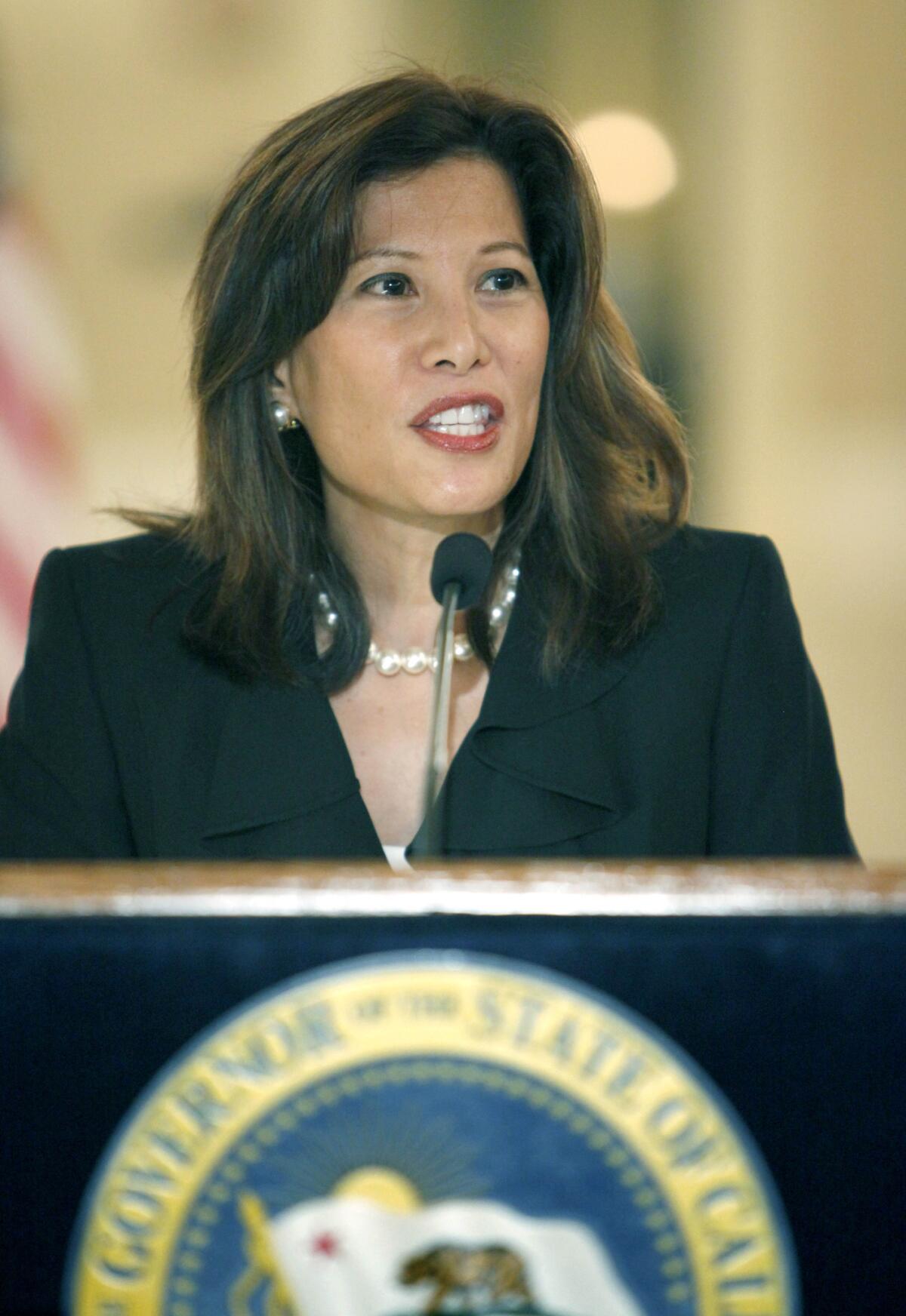Brown’s budget plan would require cuts, chief justice says

SACRAMENTO — California Chief Justice Tani Cantil-Sakauye, flanked by legislative leaders and judges, warned Tuesday that Gov. Jerry Brown’s proposed budget for the coming fiscal year would probably trigger more courthouse closures and layoffs in the state’s beleaguered judicial branch.
“We are rationing justice, and it has become more than a fiscal problem,” Cantil-Sakauye said, standing in front of more than 30 judges, court administrators, union officials, business representatives and key state lawmakers at a news conference in Sacramento. “It is, in my view, it is now a civil rights problem.… We know we are denying the protections of an American democracy.”
Although the state’s fiscal position has brightened, there is keen competition for additional dollars to make up for years of cutbacks. Supporters of social services and health agencies also have complained that Brown’s proposed budget does too little to repair the damage inflicted in the leaner years.
Brown has proposed an additional $105 million for the courts in 2014-15, but the increase would still leave the judiciary in a budget hole. The courts tapped into local reserves in the past to cushion the loss of state money, and those reserves are now largely depleted.
Cantil-Sakauye said California trial and appellate courts need an additional $266 million “just to tread water” in the coming fiscal year, $612 million to be fully functional and $1.2 billion over three years to make up for past cuts.
If Brown’s proposal is approved, Cantil-Sakauye and other court leaders say, more courts would close, delays for trials and divorce and custody matters would continue to grow, and public service hours at courthouses, already slashed, would be reduced even further.
Years of cutbacks have already forced the closure of 51 courthouses and 205 courtrooms, reduced hours at courts throughout the state, and led to increases in court user fees and legal fines. A judges’ committee reported last year that the cutbacks had created a five-month wait for trials on traffic matters in San Diego, a four-hour wait in lines in San Francisco to pay parking tickets, and flared tempers that have led to fisticuffs in lines at courthouses in Sacramento.
Much of the increase proposed by Brown would be taken by higher pension and benefit costs, the nonpartisan Legislative Analyst’s Office reported this week.
“It is possible that the increased funding proposed in the governor’s budget will only minimize further reductions of court services,” the report said.
Cantil-Sakauye spelled out the court’s needs in a three-year blueprint. In addition to just keeping courthouse doors open, the state legal system desperately needs more judges, the plan said. The Legislature authorized the creation of 50 new trial judgeships in 2007, but the state has failed to provide money to fill them, according to the blueprint.
Courthouses are also in need of major repairs, and more money is needed to provide parents and children with lawyers in cases in which counties have removed children from homes, the blueprint said. The slide in state support for courts has been deep, the report said. In 2008, money from the state’s general fund accounted for 58% of court revenues. Today, it provides 25% of court funding.
Those supporting the chief justice’s call for more funding included Senate President Pro Tem Darrell Steinberg (D-Sacramento), Senate Judiciary Committee Chairwoman Noreen Evans (D-Santa Rosa) and Assembly Judiciary Committee Chairman Bob
Wieckowski (D-Fremont).
Steinberg said he wanted the court system restored to fully functional but had not yet decided how much additional funding he would support in the new budget. Wieckowski said he favored raising the state’s contribution to $266 million, the “treading water” amount announced by the chief justice.
Cantil-Sakauye said she would meet with Brown to try to persuade him to provide more money, but a spokesman for Brown’s Department of Finance suggested that might be futile. H.D. Palmer, the spokesman, said other state services, including K-14 education, suffered even deeper cuts than the courts in recent years.
“We made it a priority to put $105 million more in the budget recognizing that they have increasing employee costs,” Palmer said.
The chief justice’s call for more funding received support from business owners and court users, some of whom also appeared at the news conference. They said long delays in obtaining trials have been costly for them.
“For business in California, just as for individuals, a fully functioning and adequately funded court system is crucial,” said Alzada Knickerbocker, owner of the Avid Reader bookstore in Davis.
McGreevy reported from Sacramento, Dolan from San Francisco.
More to Read
Sign up for Essential California
The most important California stories and recommendations in your inbox every morning.
You may occasionally receive promotional content from the Los Angeles Times.












